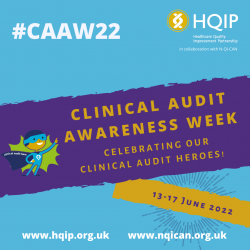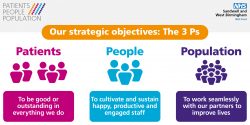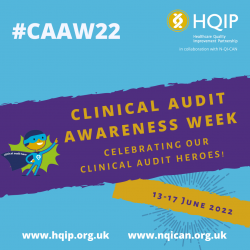Monthly archives: June 2022
Father’s Day sale in the courtyard gardens: 16 – 17 June
On Thursday 16 June and Friday 17 June, our cancer services team will be hosting a Father’s Day stall offering a variety of goods from 10.30am – 1.30pm in the courtyard gardens at Sandwell.
For further information please email jennifer.donovan@nhs.net or call ext. 2776.
Clinical Audit Awareness Week continues this week

Today we are hoping to raise awareness of the clinical guidelines process at SWB and how this relates to clinical audits.
There are hundreds of active clinical guidelines within SWB, and it is vitally important to ensure guidelines are reviewed regularly. This is to confirm that our local practice at SWB is aligned to national standards, including standards from professional bodies. It is also really important for reviewed guidelines to follow an agreed governance process before they are published, so that all the relevant stakeholders have been consulted and the content of guidelines is reflective of best practice. If you would like to know more about the governance process for guidelines at SWB or see our template for writing guidelines, please visit the teams Connect page.
Join our drop in sessions on Thursday 16 June, 10am – 2pm at the following locations:
- Hallam restaurant foyer, Sandwell
- Postgraduate Centre library, City
Can’t get make any of the sessions? A series of free national ‘Learn at Lunch’ webinars are being run by National Quality Improvement including Clinical Audit Network (NQICAN) 12.30pm – 2pm everyday during CAAW22. These will cover the role of clinical audit in the following:
- Patient safety
- Patient advocates
- Influencing change
- Health inequalities
- Future-proofing healthcare
During these webinars, the winners of the national ‘audit heroes’ for each category will be announced where SWB have five colleagues who have been nominated – click here to find out more.
For more information about the week and get in touch with the team, please email swbh.auditteam-clineffec@nhs.net.
Heatwave plan: Prepare for high temperatures

Whilst heatwave alert thresholds are not being met at the moment, colleagues are advised to take precautions and plan for hot weather. Advice on how to manage the risks associated with high temperatures is listed below.
Factors which increase an individual’s risk during a heatwave include:
- Chronic and severe illness, including heart conditions, diabetes, respiratory or renal insufficiency, Parkinson’s disease or severe mental illness.
- Medications that potentially affect renal function, the body’s ability to sweat, thermoregulation or electrolyte balance can make this group more vulnerable to the effects of heat
- Inability to adapt behaviour to keep cool: having Alzheimer’s, a disability, being bed bound, babies and the very young
Actions to be taken include the following:
- Minimise heat increase by drawing blinds or curtains
- Where possible switch off anything connected to the power system and likely to produce heat e.g. computers, printers, additional lighting
- Maintain hydration in patients
- Ensure that discharge planning takes into account the temperature of the accommodation and level of daily care during the heatwave period
The actions relating to the heatwave levels are as follows:
| LEVEL 1
Heatwave and Summer preparedness programme |
|
|
| LEVEL 2 Alert and Readiness
60 per cent risk of heatwave in 2–3 days* |
|
|
| LEVEL 3 Heatwave Action
Heatwave temperature |
Hospitals
Staff Delivering Services in the Community
|
|
| LEVEL 4
Exceptionally severe Heatwave. Central Government might consider declaring a Level 4 alert if a wide area of England and Wales, or several sectors, are affected by the threshold temperatures |
NATIONAL EMERGENCY
Central Government will declare a Level 4 alert in the event of severe or prolonged heatwave affecting sectors other than health and if requiring coordinated multi-agency response |
|
You can find further information in the Trust Severe Weather Policy:
If colleagues would like to raise any concerns regarding health and safety issues you can do this via the Trade Union collective email swbh.unioncollective@nhs.net or contact your Union using the details on Connect.
Do you need help with writing for publication?
This session introduces the basics of writing for publication, helping you plan your writing and identifying the best place to get your work published.
Topics covered include:
- Why publish?
- Formulate a plan
- Finding where to publish
- Referencing
All sessions are being run online via Teams on the dates below. If you would like to book a place either for yourself or as a group please contact the library on the details overleaf. This session cannot be run on a one-to-one basis.
- Tuesday 21 June, 2.15pm – 3.45pm
- Wednesday 20 July, 8.45am – 10.15am
- Thursday 18 August, 1.45pm – 3.15pm
To find out more or book a place please contact the library at swbh.library@nhs.net or call 0121 507 3587.
Note: If you can’t attend any of the sessions the team would be happy to
arrange a separate time for you or your team.
Introduction to critical appraisal sessions
Training sessions are now available that introduce the concept of critical appraisal and the basic structure of how to complete an appraisal.
Topics covered include:
- What is a critical appraisal?
- Why bother with a critical appraisal?
- What do you need to know to appraise an article?
All sessions are being run online via Teams on the dates below. This session cannot be run on a one-to-one basis.
- Tuesday 12 July, 1.45pm – 4.15pm
- Monday 15 August, 9.15am – 11.45am
If you would like to book a place either for yourself or as a group please contact the library at swbh.library@nhs.net or call 0121 507 3587.
Note: This session cannot be run on a one-to-one basis. If you can’t attend any of the sessions the team would be happy to arrange a separate time for you or your team.
Clinical Audit Awareness Week continues this week
Today we are hoping to raise awareness of the clinical guidelines Process at SWB and how this ties to clinical audit.
There are hundreds of active clinical guidelines within SWB, and it is vitally important to ensure guidelines are reviewed regularly. This is to confirm that our local practice at SWB is aligned to national standards, including standards from professional bodies. It is also really important for reviewed guidelines to follow an agreed governance process before they are published, so that all the relevant stakeholders have been consulted and the content of guidelines is reflective of best practice. If you would like to know more about the governance process for guidelines at SWB or see our template for writing guidelines, please visit our Connect page.
Join our drop in sessions on Thursday 16 June, 10am – 2pm at the following locations:
- Hallam restaurant foyer, Sandwell
- Postgraduate Centre library, City
Can’t get make any of the sessions? A series of free national ‘Learn at Lunch’ webinars are being run by National Quality Improvement including Clinical Audit Network (NQICAN) 12.30pm – 2pm everyday during CAAW22. These will cover the role of clinical audit in the following:
- Patient safety
- Patient advocates
- Influencing change
- Health inequalities
- Future-proofing healthcare
During these webinars, the winners of the national ‘audit heroes’ for each category will be announced where SWB have five colleagues who have been nominated – click here to find out more.
For more information about the week and get in touch with the team, please email swbh.auditteam-clineffec@nhs.net.
Strategy week: Introducing the 3Ps – Population

After lots of listening, we tried to make our strategy as simple as possible. It is centred upon 3 strategic objectives, which can be remembered as the “3 Ps”: Patients, People, and Population.
Our population objective is to work seamlessly with our partners to improve lives. We know that for many people, the issues they face are about the lack of co-ordination of services around their needs.
We also know that these gaps in care disproportionately affect those with the greatest needs and the poorest outcomes. Nationally, the NHS is undergoing structural change, creating Integrated Care Systems, Place Based Partnerships, and Provider Collaboratives. More important than the structures themselves is what these collaborations can do for our Population by working better together to deliver the right care, in the right place, at the right time.
How you fit in
As a large, integrated Trust with many different services and roles, it is not expected that every staff member will actively address all parts of the strategy at the same time. What is important is that you can see that your role does affect at least part of the strategic direction, and to think about how you could build upon or adapt what you do to help further deliver the strategy.
For example the population objective could mean making sure that a patient doesn’t get ‘lost in the system’; engaging with external partners to make care seamless for patients such as social care, primary care, other Trusts, voluntary or third sector organisations aiding better recovery and keeping patients out of hospital; sharing learning with other Trusts; employing local people and reducing our carbon footprint.
Find out more
You are welcome to join any of the Q and A sessions below:
- Monday 20 June, 9.30am – 10.30am via MS teams, click here to join
- Monday 20 June, 3.30pm – 4.30pm, Committee Room, Rowley
You can read our five year strategy here.
Our summary presentation gives a useful overview of how our objectives and plans fit together and what our priorities will be.
To find out more watch our short film that explains our strategy.
See Connect for FAQs and all the latest information.
Black Country Provider vision survey – have your say on our vision
The Black Country provider collaborative is an agreement between four NHS organisations in the Black Country to work together to provide healthcare services for the population. The collaboration is between the four main NHS Trusts that provide hospital and community services:
- Sandwell and West Birmingham NHS Trust
- The Dudley Group NHS Foundation Trust
- The Royal Wolverhampton NHS Trust
- Walsall Healthcare NHS Trust
Since the Black Country provider collaborative started working more closely together, they have begun to identify areas where we can make improvements to the healthcare services that you receive.
There are good examples where we are sharing good practice, facilities, and colleagues, such as cancer services, planned care pathways and critical care. We want partnership working to increase so that we can provide more joined up services for our patients whenever and wherever is best.
The Black Country provider collaborative want a vision for this work to get behind, but they need your help which is why they are seeking your feedback. If you wish to give your feedback, please click here to complete the Black Country provider survey.
Living with COVID-19 – Changing our approach and managing the risk
COVID-19 has tested the resolve of colleagues across the NHS and continues to impact services, however it is clear that we now need to plan for the long term and change our approach to dealing with COVID-19.
From Monday 20 June, we will be moving to our next stage of stepping down more of our restrictions to ensure that our response remains reasonable and proportionate to the risk.
Listed below are full details of our latest ‘Living with COVID-19’ guidance.
1. Mask wearing (FRSM or FFP3 depending on circumstances)
 Staff – masks are no longer a mandated requirement however they are required in the following situations:
Staff – masks are no longer a mandated requirement however they are required in the following situations:
- Masks still to be accessible for those who choose to wear them or when mask wearing is in-line with an individual risk assessment.
- Masks should be worn when caring for a COVID-19 confirmed or suspected positive patient alongside PPE appropriate to the task being undertaken. This includes within the side room where there is a COVID-19 positive patient (not within the rest of the ward if patients have not tested positive for COVID-19) and within a red ward.
- Respiratory care pathways/wards (including wards with outbreaks of respiratory infection).
- Areas where there are untriaged patients whose COVID-19 status is unknown such as A&E, UTC and primary care.
- Haem-oncology wards such as SCAT, D12, Medical Infusion Suite.
- Renal wards.
- When undertaking an AGP and patient is of unknown status or COVID positive then a FFP3 fit tested mask should be worn.
- Where there are outbreaks of COVID-19 or respiratory outbreaks such as flu.
- Ensure appropriate mask/PPE selection in line with the task that is being undertaken or as required to support transmission-based precautions.
Masks no longer need to be worn in the following areas, unless it is the staff member’s preference or requested to do so by patient or staff member:
- Clinical areas apart from those listed above.
- Non-patient facing areas such as laboratories, education centres and offices.
- Corridors and other public areas.
Wearing of Masks – Patients
- Patients with no respiratory symptoms including in outpatient clinics and waiting areas are no longer required to wear a surgical mask.
- Suspected or confirmed COVID-19 patients should be offered a mask if clinically able to tolerate on admission and on transfer to other clinical areas.
2. Visiting / attending appointments
- Current visiting arrangements to continue:
- Patients can now receive up to two visitors per day for one hour. A child can attend as one of the two visitors and remains the responsibility of the parent/guardian.
- Visiting appointments must continue to be booked with the ward, as they are currently. Visiting hours are between 11am – 7pm.
- Patients attending the Emergency department or outpatient clinics can be accompanied by a visitor.
- Visitors are asked to refrain from attending sites even for appointments if they are unwell and experiencing COVID-19 symptoms.
- Visitors are no longer required to wear masks with the exception of high-risk areas such as haem-oncology, respiratory care wards and where confirmed/suspected patients are cared for (see above list).
3. Social Distancing – 1 metre social distancing should continue where possible.
4. Outpatient and community clinics – Masks no longer required unless COVID-19 is suspected and no need for additional time between patients. Clinics can return to pre-covid capacity.
5. COVID-19 testing arrangements
Staff Testing – Lateral flow testing to continue for all patient facing staff twice weekly, however weekly lateral flow testing is now not necessary for non-patient facing staff with immediate effect.
Patient testing – Continue with current arrangements of testing on admission and on day 3, day 7 and day 13.
Contact Patients – Do not move asymptomatic contacts from their bed/ward and monitor contacts as per the recommended testing pathway.
COVID-19 positive patients – Continue with current arrangements of lateral flow testing at day 6 and day 7 or at times of capacity concerns where a site / sites are at level 4. In these circumstances lateral flow testing can be done at day 4 and day 5.
6. Ventilation – Risk assessment to be reviewed, to maintain the current strategy for ventilation with the provision of HEPA units in poorly ventilated areas.
Clinical Audit Awareness Week continues this week

Today there is a national focus on influencing change through clinical audit.
Denise Owen has been nominated to the national ‘Influencing Change Audit Hero’ competition, which is a great acknowledgement of all the hard work done by Denise and the whole team. Denise led a project that aimed to make the CQC domains more accessible and establish a review practice that could be embedded into practice. By creating an electronic tool and using clinical audit methodologies, Denise has influenced a change in culture around our approach to reviewing practice in line with CQC standards, which ultimately provides us with more opportunities to know where we can make improvements to patient care.
Please visit our clinical effectiveness Connect page to read more about the great work done by our ‘Audit Hero’ colleagues.
Join our drop in sessions: Tuesday – Thursday, 10am – 2pm at the following locations:
- Hallam restaurant foyer, Sandwell
- Postgraduate Centre library, City
Note: The team will also be at Rowley on Wednesday 15 June
Can’t get make any of the sessions? A series of free national ‘Learn at Lunch’ webinars are being run by National Quality Improvement including Clinical Audit Network (NQICAN) 12.30pm – 2pm everyday during CAAW22. These will cover the role of clinical audit in the following:
- Patient safety
- Patient advocates
- Influencing change
- Health inequalities
- Future-proofing healthcare
During these webinars, the winners of the national ‘audit heroes’ for each category will be announced where SWB have five colleagues who have been nominated – click here to find out more.
For more information about the week and get in touch with the team, please email swbh.auditteam-clineffec@nhs.net.
← Older items Newer items →